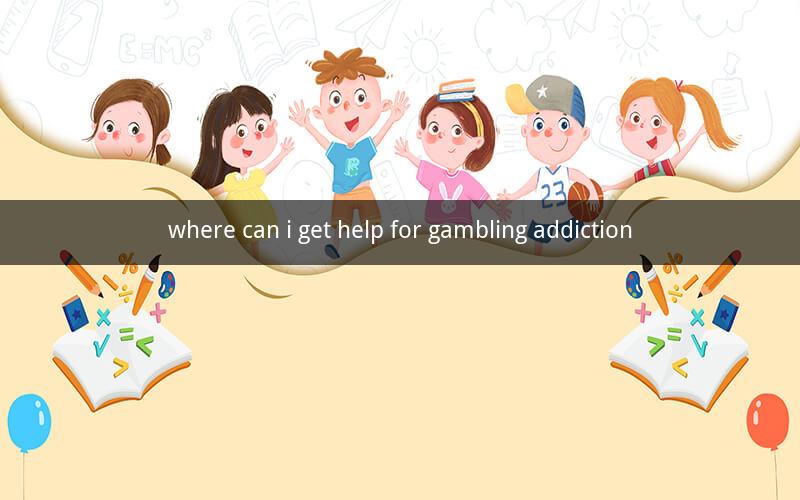
Directory
1. Understanding Gambling Addiction
2. The Importance of Seeking Help
3. Identifying Symptoms of Gambling Addiction
4. Professional Help Options
4.1 Therapists and Counselors
4.2 Support Groups
4.3 Inpatient and Outpatient Programs
5. Online Resources and Hotlines
6. Community and Family Support
7. Self-Help Strategies
8. The Role of Technology in Addiction Recovery
9. The Legal and Ethical Implications of Gambling
10. Long-Term Recovery and Relapse Prevention
1. Understanding Gambling Addiction
Gambling addiction, also known as compulsive gambling or pathological gambling, is a serious condition characterized by an inability to control the urge to gamble, despite negative consequences. It can affect individuals of all ages, genders, and socioeconomic backgrounds. Understanding the nature of this addiction is crucial for those seeking help.
2. The Importance of Seeking Help
Seeking help for gambling addiction is vital for several reasons. It allows individuals to address the underlying issues that contribute to their gambling behavior, develop coping strategies, and regain control over their lives. Treatment can also help prevent further damage to personal relationships, finances, and mental health.
3. Identifying Symptoms of Gambling Addiction
Recognizing the symptoms of gambling addiction is the first step in seeking help. Common signs include:
- Preoccupation with gambling, even when not engaged in the activity.
- Needing to gamble with increasing amounts of money to achieve the desired thrill.
- Feeling restless or irritable when attempting to cut down or stop gambling.
- Continually returning to gambling despite knowing the harm it causes.
- Risking or losing a job, relationship, or other significant opportunity due to gambling.
4. Professional Help Options
Several professional help options are available for those struggling with gambling addiction:
4.1 Therapists and Counselors
Therapists and counselors can provide individualized treatment plans tailored to an individual's specific needs. Cognitive-behavioral therapy (CBT) is particularly effective for gambling addiction, as it helps individuals identify and change negative thought patterns.
4.2 Support Groups
Support groups, such as Gamblers Anonymous, offer a sense of community and understanding among individuals struggling with gambling addiction. They provide a safe space to share experiences, learn from others, and develop strategies for recovery.
4.3 Inpatient and Outpatient Programs
Inpatient and outpatient programs offer structured treatment options that can range from a few days to several months. These programs may include therapy, group support, and educational components to help individuals develop the skills needed to overcome their addiction.
5. Online Resources and Hotlines
The internet is a valuable resource for those seeking help with gambling addiction. Many websites offer information, support, and resources for individuals struggling with this issue. Additionally, hotlines can provide immediate assistance and guidance.
6. Community and Family Support
Community and family support can play a significant role in an individual's recovery process. Encouraging loved ones to attend family therapy or support groups can help them understand the addiction and learn how to support their loved one effectively.
7. Self-Help Strategies
Self-help strategies can complement professional treatment and support groups. These may include:
- Setting strict limits on gambling activities.
- Avoiding triggers that may lead to gambling.
- Engaging in healthy activities to fill the time and reduce the urge to gamble.
8. The Role of Technology in Addiction Recovery
Technology can be a powerful tool in addiction recovery. Apps and online tools can help individuals track their gambling behavior, set limits, and access support resources. Additionally, technology can facilitate communication with therapists and support groups.
9. The Legal and Ethical Implications of Gambling
Gambling laws vary by country and region, and ethical considerations are also important. It's crucial for individuals to understand the legal and ethical implications of their gambling behavior to avoid further harm.
10. Long-Term Recovery and Relapse Prevention
Long-term recovery from gambling addiction requires ongoing vigilance and commitment. Relapse prevention strategies, such as continued therapy, participation in support groups, and maintaining a healthy lifestyle, are essential for long-term success.
---
FAQs
1. Q: Can gambling addiction be cured?
A: While there is no permanent cure for gambling addiction, it can be effectively managed with the right treatment and support.
2. Q: Is there a genetic component to gambling addiction?
A: Yes, research suggests that genetics can play a role in the development of gambling addiction, although environmental factors also contribute significantly.
3. Q: Can therapy help someone overcome a gambling addiction?
A: Yes, therapy, particularly cognitive-behavioral therapy, has been shown to be effective in treating gambling addiction.
4. Q: How long does treatment for gambling addiction typically last?
A: Treatment duration varies depending on the individual's needs, but it can range from a few weeks to several months or longer.
5. Q: Are there any medications available to treat gambling addiction?
A: Currently, there are no FDA-approved medications specifically for treating gambling addiction, but some medications may help manage associated symptoms.
6. Q: Can someone recover from a gambling addiction without professional help?
A: While some individuals may recover on their own, professional help is often necessary to address the complex nature of gambling addiction.
7. Q: What should I do if I think a loved one has a gambling addiction?
A: Encourage them to seek help, offer support, and learn about the addiction to better understand what your loved one is going through.
8. Q: Are there any support groups for family members of individuals with gambling addiction?
A: Yes, there are support groups like Gam-Anon specifically for family members and loved ones of individuals with gambling addiction.
9. Q: Can gambling addiction lead to financial ruin?
A: Yes, gambling addiction can have severe financial consequences, leading to debt, foreclosure, and bankruptcy.
10. Q: How can I prevent a relapse after overcoming a gambling addiction?
A: To prevent a relapse, maintain a strong support system, continue therapy or counseling, and stay vigilant about triggers and stressors that may lead to gambling.